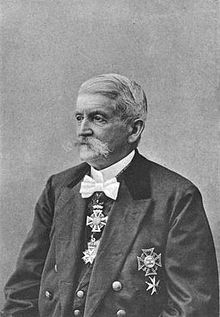Gustav von Diest
Gustav Friedrich Heinrich Paul von Diest (born August 16, 1826 in Posen , † February 27, 1911 in Merseburg ) was a lawyer , Prussian district president and author .
family
Diest comes from an old aristocratic family that begins its lineage with the Lutheran theologian and pastor Herrmann Tegeler von Diest in Diestedde (now part of Wadersloh ) in the Westphalian district of Warendorf , and was the son of the later Prussian Lieutenant General Heinrich von Diest (1785–1847), former imperial Russian general staff officer and adjutant of Tsar Alexander II. and military attaché in Berlin , and Adelheid von Gerhardt (1794-1832).
Diest married on March 3, 1859 in Frankfurt (Oder) Anna von Thile (born August 20, 1830 in Berlin, † October 5, 1908 in Merseburg). His wife was the daughter of Adolf von Thile (1784–1861), Prussian general of the infantry, and Auguste von Schöning (1788–1859). His daughter Elisabeth (1862–1946) married the brothers Siegfried and Wilhelm von Quast one after the other .
Her gravestones can still be found today in the Campo Santo cemetery in Radensleben near Neuruppin, which Ferdinand von Quast laid out in 1854 .
Life
Diest began his career as an auscultator in 1848 , became a government trainee in Potsdam in 1850 , was interim district administrator of the Ruppin district in Neuruppin in 1851/1852 and became a government assessor in Düsseldorf in 1854 . In 1857 he went to the Oberpräsidium in Koblenz , in 1858 became district administrator of the Wetzlar district and in 1866 civil commissioner for Nassau .
Between 1867 and 1874 Diest was first a member of the Reichstag of the North German Confederation and then of the German Empire. He was first elected in the Reichstag constituency Wiesbaden 3 and then in the Reichstag constituency Danzig 2 . He belonged to the conservative party.
From 1867 to 1869 he was district president in Wiesbaden . As early as 1869 he was transferred to Danzig , because as a conservative he had violent arguments with the liberal Karl Braun . Bismarck wanted to keep Braun, who was one of the leaders of the national liberal parliamentary group, well balanced and therefore promoted Diest's transfer. From 1869 to 1876 he worked as district president in the Gdansk district and from 1876 to 1894 in the Merseburg district .
He was a member of the General Synod and a real privy councilor . From 1867 to 1874 he was a member of the German Reichstag for the Conservative Party (KoP) and from 1894 until his death (1911) a member of the Prussian mansion . Diest was dean of the Merseburg cathedral monastery and legal knight of the Order of St. John .
Fonts
- My trip to the Orient in the spring of 1899. Berlin: Mittler 1899
- From the Life of a Happy One: Memories of an Old Official. Berlin: Middle 1904
literature
- Gothaisches Genealogical Pocket Book of the Noble Houses , Part B 1941, page 124, Verlag Justus Perthes, Gotha 1941
- Acta Borussica Volume 5 (1858–1866) ( Memento from January 21, 2010 in the Internet Archive )
- Acta Borussica Volume 6 / I (1867–1878)
- Acta Borussica Volume 6 / II (1867–1878)
- Acta Borussica Volume 7 (1879–1890) (PDF file; 2.83 MB)
- Acta Borussica Volume 8 / I (1890–1900) (PDF file; 2.72 MB)
- Acta Borussica Volume 8 / II (1890–1900) (PDF file; 2.19 MB)
Web links
- Literature by and about Gustav von Diest in the catalog of the German National Library
- Literature list in the online catalog of the Berlin State Library
- Gustav von Diest in the database of members of the Reichstag
- Biography of Gustav von Diest . In: Heinrich Best : database of the members of the Reichstag of the Empire 1867/71 to 1918 (Biorab - Kaiserreich)
- Diest, Gustav Friedrich Heinrich Paul von. Hessian biography. (As of February 3, 2020). In: Landesgeschichtliches Informationssystem Hessen (LAGIS).
Individual evidence
- ↑ Lotte Knabe: Diest-Daber, Otto Karl Erhard Heinrich von. In: New German Biography (NDB). Volume 3, Duncker & Humblot, Berlin 1957, ISBN 3-428-00184-2 , p. 664 ( digitized version ).
| personal data | |
|---|---|
| SURNAME | Diest, Gustav von |
| ALTERNATIVE NAMES | Diest, Gustav Friedrich Heinrich Paul von (full name) |
| BRIEF DESCRIPTION | German politician, MdR, District President in Merseburg |
| DATE OF BIRTH | August 16, 1826 |
| PLACE OF BIRTH | Poses |
| DATE OF DEATH | February 27, 1911 |
| Place of death | Merseburg |


